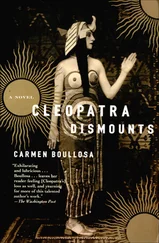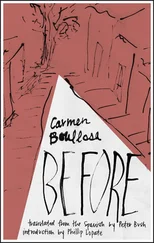“I said to him, ‘I really love your fritters, Mr. German. Thanks so much.’
“He replied, ‘I’m not German. I’m Austrian.’
“‘Well, where were you born?’
“‘In the Vatican.’
“‘Then you’re not German or Austrian, either. And that’s why you’ve never married. You were born in the land of priests and altar boys.’
“‘My father was the agent of the Duke of Baden-Baden and managed his affairs in the Vatican. He spent three years there with his family. That’s where I was born, and that’s where we buried my mother, who died very young. I hadn’t reached my second birthday before we were back in Baden-Baden. I don’t have one memory of the Vatican. I was German, but I changed my nationality when I came to Mexico as a volunteer with the army of the emperor Maximilian. And here I stayed, looking after piles of stones and getting only insults for it, till I turned my eyes to the plants, and they’re what occupy me now.’
“‘The German isn’t Austrian either,’ said my grandmother. ‘He’s been here so long he’s more Mexican than tamales and mole .’
“‘What do you mean mole ?’ he replied. ‘We don’t eat that stuff around here.’
“‘Did you really come with Maximilian? You must be really ancient,’ I said with the astonishment to be expected of a child.
“My grandmother gave me a clout for being cheeky.
“‘Let her alone,’ he said. ‘She’s right and I’m not offended.’
“‘Well, I am offended,’ said my grandmother. ‘You’re younger than I am. And if I’m up to making these trips, I’m not having anybody calling me aged, just imagine, when we’ve traveled all that way through jungle, with all that heat, and all those ups and downs, any one of my bones could have gone snap, I don’t know how they didn’t …’
“The aunt who was sick both night and day had one key symptom — she couldn’t distinguish dark from light. A strange infirmity made her insensitive to light. She saw everything in a misty light, though she hadn’t cataracts or anything similar in her eyes; it was just something sick inside her that caused it. Since night and day were the same to her, she had trouble sleeping. She’d be wide awake or fast asleep regardless of the time of day. Sometimes she spent days in nightgowns that were embroidered to the point of looking ridiculous, and that night we spent stranded at her house I caught dreamy glimpses of her walking about the house, dressed like she was heading off to a fancy party, but the grandfather clock was striking four in the morning.
“She simply didn’t have the same clock as other people, and there was no pretending she did. She had only one goal in life, and it got in the way of even the most basic forms of politeness — I mean to sleep. She dedicated herself to that goal with admirable tenacity, but, sadly, got very poor results. She was lucky if she got an hour of sleep. Usually it was no more than fifteen minutes at a time. Then she’d wander around for hours trying to nod off or get some sort of rest, stumbling around with her misty vision, or stretched out on her bed, her mind rambling.
“I felt very sorry for her. She suffered far too much with that horrible disease. They say she got it from an insect bite in the jungle. It must have happened when she was strolling there with the German …”
The following Sunday the army marched into town. Minutes before the clock struck eight, while the church bells were summoning the faithful to the second Mass of the day, there arrived in the park four trucks painted green from top to bottom. An uncounted number of uniformed men clambered down from them, armed to the teeth. The vehicles moved away and the men took control of the town center without giving a word of explanation to anyone. First they formed up to block all entrance to the porch of the church. The priest came out to see why he had only two parishioners inside, two old biddies who heard Mass after Mass, stuck like toadstools to the pews, and why the statues of the saints, the images of the Virgin Mary, the candlesticks, and the flower vases had all suddenly fallen out of their places over the altar’s top, down from all its nooks and crannies. Fully dressed to say Mass in his vestments of white and gold, he collided with the army of green men, behind which he assumed his parishioners were waiting. Without changing his dress, he tried to pass through the wall of men, but each soldier was holding his rifle horizontally just below the level of his helmet and they formed an impenetrable barrier. He asked to speak with the general or the colonel or the ranking officer.
But nobody paid him any attention, as if they hadn’t a clue what he meant by “general or colonel or ranking officer.” For their reply they stared at him head-on, though in reality, since they were so focused on standing firm and holding their weapons just right, they barely saw him.
“What a screw-up!” the priest was thinking, he told us later. “Another Sunday without a Mass. What’ll become of my flock?”
If it isn’t disrespectful to the clergy, I imagine he was also saying: “What bloody bad luck! Things are really screwed up now. I’m not going to be able to fuck my little shepherdess in our hammock!”
To top it off, the poor priest had to suffer one more aggravation. In front of him the formation of soldiers — the hair under their gleaming helmets must have been smoldering in the heat of that tropical sun — blocked his way, but he was also unable to get through the side door of the sacristy because one of the trucks had now parked right against the wall, so he couldn’t open the sacristy door. There he was stuck with the two old biddies, his altar boys, and his indefatigable nuns, unable to leave and eat breakfast, even though his guts were rumbling. At eleven-forty, according to the town clock on which we all relied — it was set on top of a column of carved wood, at the entrance of the furniture store on the corner of Hildalgo facing the park — the soldiers started to faint. Whose idea had it been to put metal helmets on their heads in this heat? It was absolutely insane. We never found out why in hell’s name they’d come into town, though we suspected they’d heard about the problem with the market roof and that the central government had sent them, with its usual efficiency, to “help the victims,” but that’s only a guess, because nobody made clear what job they were expected to do. What nobody could doubt was that the sun had beaten them. The heat finished them off, knocking them over one after another.
No sooner had they collapsed than the priest, in absolute fury, dashed from the porch, without even looking at them, crossed the park, and marched off to his traditional Sunday breakfast, without one sign of sympathy for the fallen. We and the three nuns followed after him, treading on his heels, and the rest of the townsfolk followed his example, in that nobody was ready to help the victims of the sunstroke.
It was quite a while before the other soldiers, two in each vehicle, the driver and his mate, woke up from their midday nap and came down to the square to find their missing comrades. They went from house to house asking for water without the least sign of friendliness and then doused the fainted soldiers in bucketfuls.
On our return from breakfast the park was streaming with water. In the midst of the steam that the heat was creating, soldiers staggered about unsteadily, supported on the shoulders of the eight still-healthy men who bundled them like parcels into the trucks, which were also wrapped in fog. They took so long about it that by the time the last of the soldiers was aboard, there wasn’t a trace of water left in the park or one soldier capable of standing to attention. The trucks made off, their springs squeaking. A few waterlogged weapons remained on the ground and the priest had them taken into the sacristy. Afterward, he told me to pass the word along that he’d be saying Mass at six o’clock. In the circumstances, Mass turned out to be straight speechifying. We gathered in the church and the priest harangued us with every sort of argument against the army, weapons, wars, preaching peace in a lengthy, moving sermon that took so long he could have said two High Masses in the time. When he saw his flock starting to snooze off, he glanced at the clock and promised to finish off the Mass the next Sunday. It goes without saying that there was no strolling through the park that day, with the men circulating in one direction and the women in the other. The band didn’t play and several of us kids went without supper because we were already fast asleep by the time we got home. Who knows how long the priest went on, violently condemning violence (the nonverbal kind), even misquoting passages of the Bible to make his point?
Читать дальше












